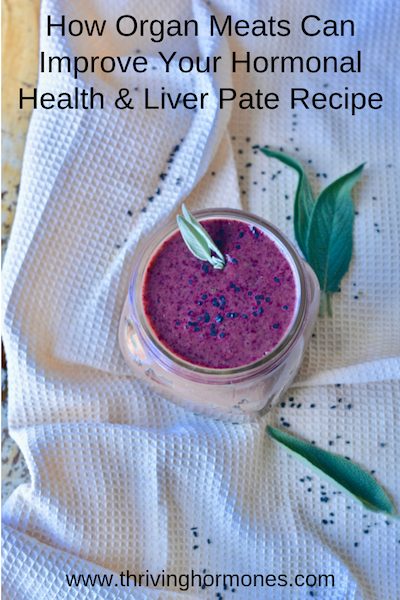How Organ Meats Can Improve Your Hormonal Health & Liver Pate Recipe
The importance of balanced hormones is known to all. However, there is one thing that is still very hard to understand; the moving components and the amount of nutrients needed to keep things in proper balance. Consider this; if your pituitary gland does not get sufficient vitamins D and E or magnesium, it will not be able to secrete hormones in the right way. That would even affect different glands and organs that rely on the pituitary signals.
Lack of these substances would also lead to a lack of thyroid hormone, which can affect metabolism. When it comes to hormones, there are a number of things that can happen wrong in several places. Therefore, it is just imperative to balance and support them in all manner possible. Although there are a number of modern ways this can be done, it would be better to take a walk down the history path and see how it can affect what we have ahead of us.
Traditional Nutrition and Its Effects on Health Today
Research carried out over the past few years indicates that we continue to grow sick each and every day. The fact that our old folks did not suffer the kind of illnesses we suffer today, one obvious question arises; what prevented them from encountering the prevalent hormonal cancers we undergo today. While we have to deal with ever-dropping life expectancy and endless chronic fatigue, these people remained healthy and vibrant throughout.
Although the answer to this question might be in many faces, long-time research reveals that diet played a significant role in ensuring that these people had the best health.
One of the foods that are so much rich in nutrients is none other than the grass-fed organ meats. In fact, the level of nutrients in these foods is even higher than those in turmeric, kale and other superfoods like spirulina.
It would be essential to take a quick look at the four basic organ meats and the benefits they have for our hormones. Since these foods do not have good tastes, you can still enjoy the benefits they have even without eating them.
What Role Does Liver Meat Play in Balancing Hormones?
This is what you get when you compare the density of nutrients of the grass-fed liver with a conventional piece of steak;
- Four times more iron
- 16 times more vitamin D
- Double the initial amount of selenium
- Five times more vitamin B12
- Almost 5,000 times the amount of vitamin A
The grass-fed beef is also the richest provider of REAL Vitamin B12, which can only be found in animal products in abundance.
This vitamin is one the most important vitamins to stay alive and is involved in a number of processes in the body of human beings, many of which affect the hormones.
A deficiency of vitamin B12 can bring about hormonal imbalances, with either too many or too few of those hormones causing malabsorption of B12. Estrogen is a good example. In a study carried out in 2012, birth control pills can cause a deficiency of vitamin B12, and this, in turn, might cause defective implantation, changes in ovulation and ultimate infertility.
Vitamin A is the other nutrient the grass-liver is known for. For a number of biochemical processes, this vitamin plays a major role in both the production of the hormone as well as the function of the thyroid. And whereas Vitamin A obtained from various plants is one of the best antioxidants, changing it into a real vitamin A is not that easy. This is why your body should always facilitate the regulation of the thyroid and the synthesis of hormones. Vitamin A obtained from animal sources is the best because it offers nutrients in their real bioavailable nature.
The Benefits of Kidney for Hormone Health
Selenium is the top nutrient that kidney meat gives. Apart from the neuroprotective nature that it comes with, it also assists for the metabolism and manufacture of thyroid hormones. Since the enzymes involved in the conversion of T4 to T3 depend on selenium, this underrated yet so essential mineral is highly needed.
In addition to that, it also assists in cleaning the body of too much estrogen, which can lead to fibroids, PCOS, endometriosis, and other reproductive parts.
Here are the other nutrients that you will get from grass-fed kidney meat plant:
- Copper
- Iron
- Zinc
- Phosphorus
- Vitamin A
- Vitamins B2, B3, B5, B6, B9, and B12
Grass -Fed Heart for Hormone Balance
The leading copper food source in the entire world is nothing but beef heart. In addition to that, it also gives complementary nutrients like zinc.
The health benefits of grass-fed heart for a balanced hormone are entirely based on its collagen. The main work of collagen is to offset the cortisol imbalance as it balances the HGH, DHEA, Insulin, Progesterone, and melatonin among others.
Collagen also comes with high amounts of amino acids that assist in balancing the hormones. It uses its great glutamine, proline, and arginine contents to assist in producing optimal degrees of hormones. Its glycine also aids in preventing toxic xenoestrogens because it is liver-supportive.
CoQ10, a mineral that is used nearly by all cells in the body is also found in the beef heart. The supplementation of this mineral can assist the fertility in both male and female.
Grass-Fed Beef Brain
Beef is one of the rich sources of DHA, EPA, as well as omega-3 fatty acids. Omega-3s are very essential nutrients, and even though they are crucial for human function, human being do not produce them. Therefore, it must be obtained from outside sources of diets. Its role in ensuring that the hormones are balanced is less known as compared to other numerous roles that it plays.
Human bodies are not able to produce the hormones where there are not enough omega-3 fatty acids. Therefore, it turns to other relatively lower quality sources of fats. Apart from producing the hormones, omega 3s also assist in transport and communication. As a matter of fact, omega-3s can bring about the right responses while using less few hormones and conserving energy.
The beef heart can also provide neuroprotective nutrients like phosphatidylcholine and phosphatidylserine. There are also other antioxidants such as carotenoids, carnosine, as well as tocopherols, and all these are beneficial in the protection of neurological tissue.
Other Important Nutrients Needed in the Regulation of Hormones
A number of these organs have B vitamins, which play a significant role in hormone health. For example, vitamin B5 is directly involved in the production of the steroid hormone. Other hormones such as progesterone and estrogen will not be sufficiently manufactured without enough amounts of the B5 vitamin.
Vitamin B6 is also critical since it binds to the excessive amounts of hormones like the progesterone, assisting in lowering the risk of hormonal cancers.
Saturated Cholesterol and Fats
Now, this is the part that most people might be so concerned with. Although organ meats have so many benefits, many might worry about its cholesterol and saturated fat content. Dangers of these chemicals have been said over and over, but there are some studies that have proved otherwise. One of these studies was the 12-year old one that covered more than 12,000 patients and proved that the deaths of these patients were caused by too low cholesterol.
Other studies have also shown that sugar is the worst offender, especially when it comes to heart-related diseases. Both saturated fats and cholesterol are very important for immune function, hormone balance, as well as neural signaling. Since the cholesterol is a precursor to the classes of steroid hormones like progestogens, glucocorticoids, and androgens, our bodies might not produce certain hormones without the cholesterol.
How to Work Organ Meats Into Your Diet
Now that you are quite aware of the input organ meats bring to your health, particularly your hormones, including them into your next meal would be important.
Although some might find the smell and taste of organ meats quite unbearable, there are certain things you can do to make them feel better.
The first suggestion is to grind them and mix them with ground beef so to be applied in meatloaf and meatballs.
In a savory sausage hash, others prefer to use chopped liver in chili. There are other better tips you can use to skip the smell, and taste of preparing organ meats is by replacing them with Grass-Fed Organ Complex. This is a gently freeze-dried powered kind of grass-fed beef liver, kidney, brain, and heart, contained within a capsule that is entirely tasteless.
At times, reinventing the whole system might not be necessary, particularly when it comes to our hormone health. Sometimes just going back to our roots and getting some of the nutritional gems that kept our fore parents healthy might be the solution!
I come from Poland where we eat organ meats pretty much on a daily basis. I have a great family recipe for you – my favorite liver pate with wild blueberries jelly.
Liver pate with wild blueberries.
Ingredients
- 1,8 lbs. chicken or beef liver
- 2 T balsamic vinegar
- 2 T sage
- 1 T salt
- 1 T cinnamon
- 1/2 C oil olive plus more for the pan
- ¾ C shallots chopped (if not avoiding FOODMAPS)
- ½ tsp. black pepper
- 2 T ghee if you can eat dairy
- Jelly:
- 6 oz. blueberries
- 1/2 cup water
- 2 tablespoons gelatin
- 2 T balsamic vinegar
- 4 T water
Directions:
Heat frying pan with 2 T olive oil or ghee. Add shallots and brown it (approximately 5 min). Add the liver and cook for about 10 min. Leave aside for cooling.
When the liver is cold add all the ingredients to the food processor and blend it until silky smooth.
Transfer to a Mason jar or Pyrex glass containers.
To make the jelly:
Put 2 T gelatin into a bowl. Add 4 T water and whisk until you see that is gelatinizing. Add all the ingredients to the food processor and blend it. Pour it over the pate in the jar and refrigerate.
In Health,
Angie



